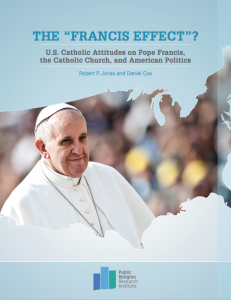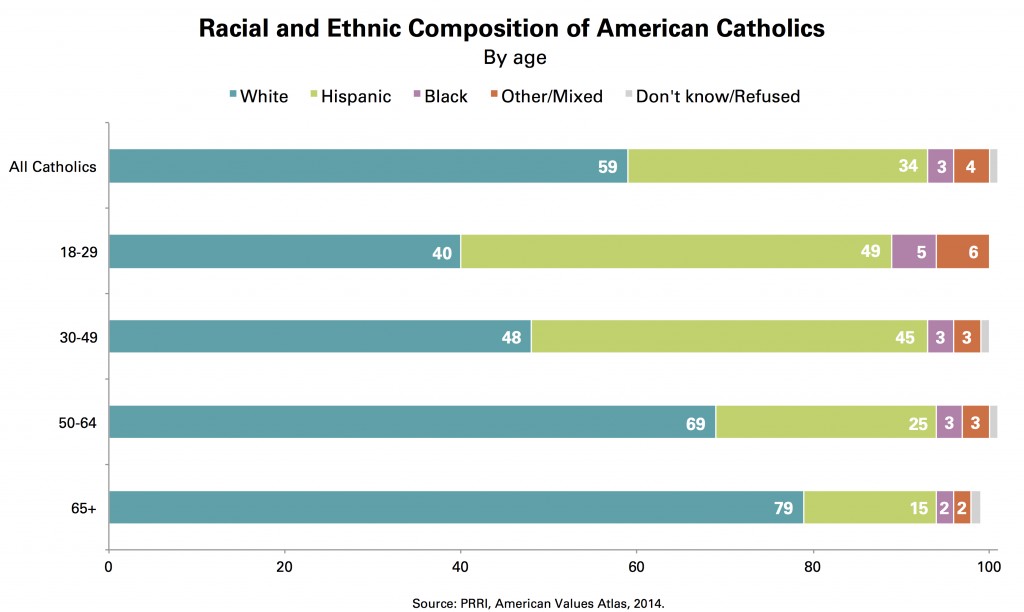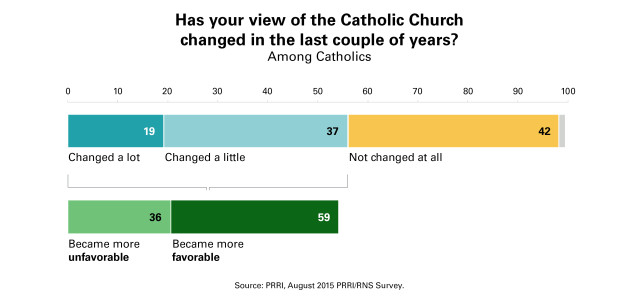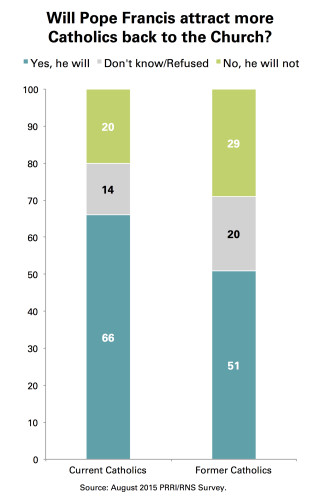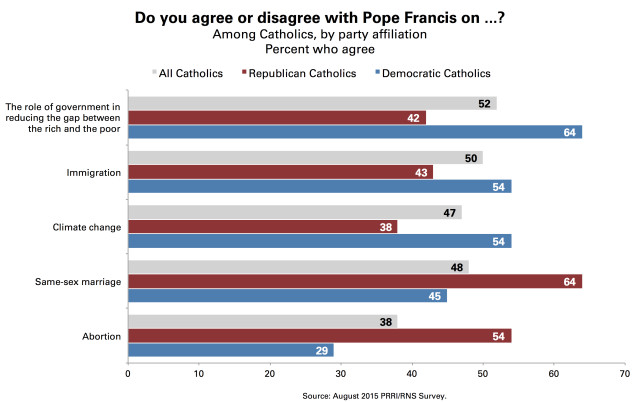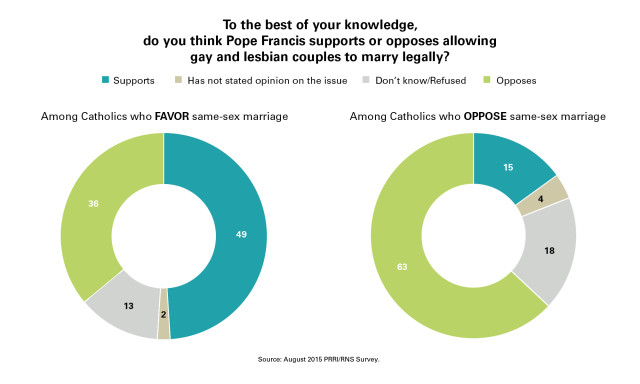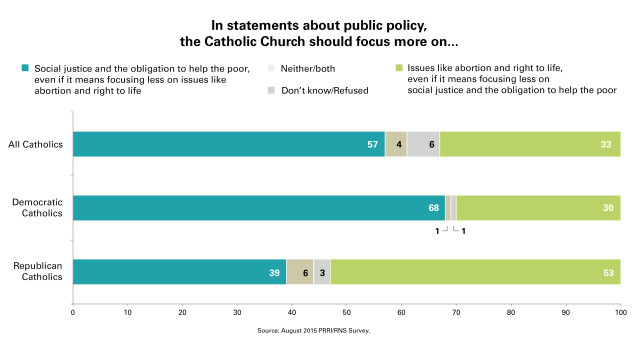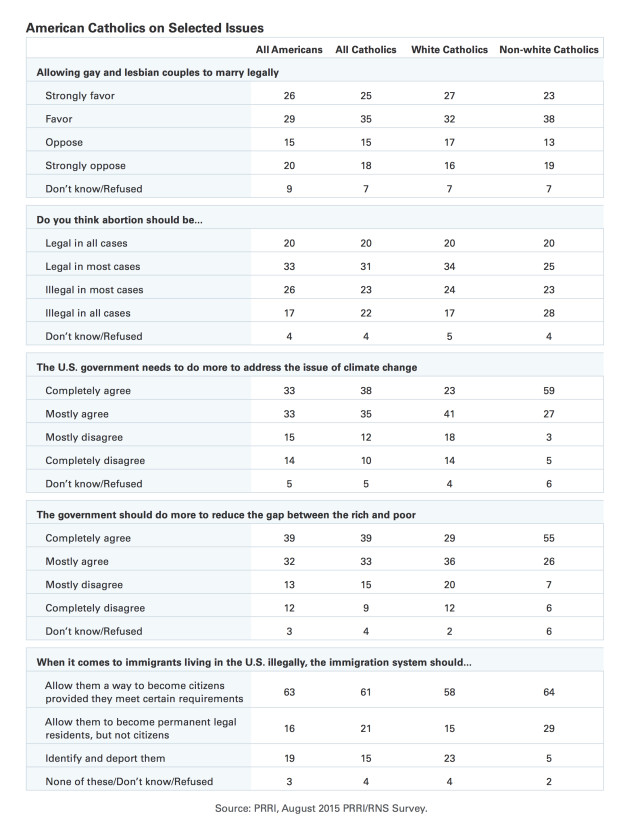I. A Brief Profile of American Catholics
According to PRRI’s 2014 American Values Atlas 1, American Catholics account for roughly one in five (22%) American adults, a figure that has been relatively stable over the last four decades.2 The stability in the size of the Catholic population belies considerable change in its ethnic and racial composition. While the ratio of white to Hispanic Catholics was roughly ten to one in the early 1990s, today that ratio is less than two to one.
Currently, roughly six in ten (59%) Catholics are white non-Hispanic, more than one-third (34%) identify as Hispanic, and seven percent identify as some other race or as mixed race. The ongoing ethnic transformation of the Catholic Church can also be seen in the stark ethnic differences among U.S. Catholics by age. Catholic seniors (age 65 and over) are roughly twice as likely as young Catholics (age 18-29) to be white (79% vs. 40%, respectively). And these younger Catholics—at 49% Hispanic—are on the cusp of becoming majority Hispanic.
The ethnic composition of U.S. Catholics also varies considerably by region. More than three-quarters (76%) of Catholics in the Northeast are white, compared to only 17% who are Hispanic. Conversely, approximately six in ten (59%) Catholics living in the West are Hispanic, while less than one-third (31%) are white. Hispanic Catholics now make up the majority of the Catholic population in five states: Texas (74%), California (70%), New Mexico (70%), Arizona (59%), and Nevada (59%). These states with Hispanic Catholic majorities also have large Catholic footprints, with Catholics constituting at least one-quarter of the population in each.
II. Former Catholics
According to August 2015 PRRI/RNS Survey, roughly one-third (35%) of Americans say they were raised in a Catholic household. While most Catholics have remained within the religious fold, significant numbers have left. Today, 15% of Americans are former Catholics: those who were raised Catholic but no longer identify as such.
Nearly half (49%) of former Catholics now identify as religiously unaffiliated, while nearly four in ten (39%) now identify as Protestant and nearly one in ten (9%) identify as a member of a non-Christian religion.
There are a number of significant differences between Catholics and former Catholics. For example, a majority (55%) of former Catholics are men, while a majority (56%) of current Catholics are women. Former Catholics are also twice as likely as Catholics to be under the age of 30 (33% vs. 16%, respectively). Former Catholics are more likely than current Catholics to identify as politically liberal (37% vs. 27%, respectively) and as political independents (50% vs. 36%, respectively). Notably, there are no significant differences between former Catholics and current Catholics in terms of educational attainment or household income.
III. Pope Francis, the Catholic Church, and the U.S. Bishops
Knowledge of the Papal Visit to the U.S.
Most Americans (52%) say they have heard nothing about the pope’s upcoming visit to the U.S. Fewer than half of Americans say they have heard a lot (13%) or a little (34%) about it.
Catholics are much more likely than Americans overall to have heard about the pope’s impending visit to the U.S. Nearly seven in ten Catholics say they have heard a lot (25%) or a little (44%) about it. Thirty-one percent of Catholics say they have heard nothing at all about the pope’s visit.
Pope Francis and the Catholic Church
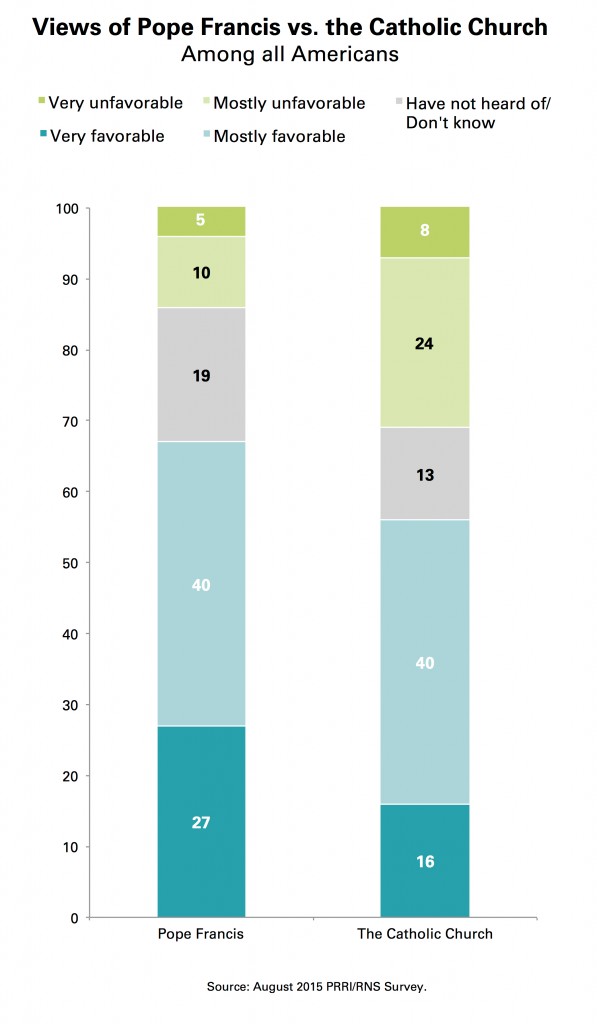 More than two years into his papacy, Pope Francis remains popular among the American public. Two-thirds (67%) of Americans have a favorable view of the pope, while 15% say they have an unfavorable view. Nearly one in five (19%) Americans did not offer an opinion about the pope.
More than two years into his papacy, Pope Francis remains popular among the American public. Two-thirds (67%) of Americans have a favorable view of the pope, while 15% say they have an unfavorable view. Nearly one in five (19%) Americans did not offer an opinion about the pope.
Views of the Catholic Church are also relatively positive, but significantly less favorable than views of the pope. A majority (56%) of Americans have a favorable view of the Catholic Church, compared to roughly one-third (32%) of Americans who hold unfavorable views of the Catholic Church.
There are notable differences among religious groups in how Pope Francis and the Catholic Church are perceived. The overwhelming majority of Catholics have a favorable view of Pope Francis (90%) and the Catholic Church (89%). In contrast, former Catholics have much more positive views of the pope (64%) than the Church (43%).
Among religiously unaffiliated Americans, six in ten (60%) express a favorable opinion of the pope, while fewer than four in ten (37%) have favorable views of the Catholic Church. The views of white mainline Protestants closely resemble the general public, expressing somewhat more positive views of the pope (66%) than the Church (56%). Compared to other religious groups, white evangelical Protestants hold lower opinions of both the pope (51%) and the Catholic Church (49%).
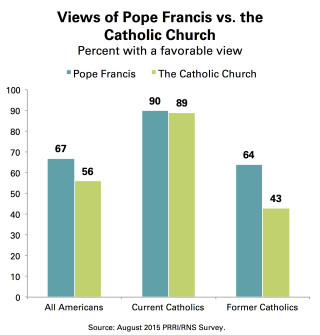 All generational cohorts generally hold strongly favorable views of the pope,but there are sharp generational divides in views of the Catholic Church. Among young adults, the pope’s popularity far outpaces the Church’s. Nearly two-thirds (65%) of young adults (age 18-29) have positive views of Pope Francis, while less than half (48%) express a favorable view of the Church. In contrast, seniors (age 65 and over) are about equally as likely to have favorable views of the pope (67%) as the Church (62%).
All generational cohorts generally hold strongly favorable views of the pope,but there are sharp generational divides in views of the Catholic Church. Among young adults, the pope’s popularity far outpaces the Church’s. Nearly two-thirds (65%) of young adults (age 18-29) have positive views of Pope Francis, while less than half (48%) express a favorable view of the Church. In contrast, seniors (age 65 and over) are about equally as likely to have favorable views of the pope (67%) as the Church (62%).
Political liberals and conservatives hold significantly different views of the pope and the Catholic Church. Self-identified liberals are much more likely to hold favorable views of the pope (76%) than of the Catholic Church (48%). Conversely, while conservatives hold significantly less favorable views of the pope than liberals, there is no favorability gap among conservatives, who have equally positive views of Pope Francis (62%) and the Catholic Church (62%).
In Their Own Words: Open-Ended Responses about Pope Francis and the Catholic Church
The favorability gap between the pope and the Catholic Church is also reflected in open-ended responses. When asked to share the first word or phrase that comes to mind, Americans are three times as likely to offer positive associations about the pope as they are about the Catholic Church.
More than one-quarter of Americans offer a positive association with Pope Francis, including that he is compassionate or caring (11%), humble (4%), or some other positive comment (12%). Only five percent mentioned something negative such as the scandal over the sexual abuse of children by priests (1%) or a general negative comment (4%). Twelve percent of Americans say the pope is progressive, while 25% made some other neutral descriptive comment. Nine percent offered some other association, and more than one in five (22%) offered no opinion.
Americans are more than twice as likely to offer negative than positive associations with the Catholic Church. Roughly one in ten Americans offer a positive association with the Catholic Church, mentioning charitable work (5%) or some other generally positive attribute (4%). About one-quarter of Americans have a negative association with the Catholic Church, saying it is judgmental or dogmatic (7%), hypocritical (8%), overly concerned with money (4%), or offering a less specific negative comment (6%). Approximately four in ten offer descriptive neutral evaluations of the Church, mentioning Catholic religious beliefs or practices (23%), Catholic religious leaders such as priests or nuns (8%), or that the Church is traditional and hierarchical (7%). Six percent offered some other type of comment and 15% offered no opinion.
Perhaps not surprisingly, former Catholics are much more likely than current Catholics to express negative views about the Church. Former Catholics are about twice as likely as current Catholics to make a negative comment about the Church (39% vs. 22%, respectively), and are five times more likely to mention the clergy sex abuse scandal (11% vs. 2%, respectively). In turn, current Catholics are far more likely than former Catholics to offer descriptive neutral comments, mentioning Catholic religious practices or beliefs (37% vs. 23%, respectively), and to mention positively the charitable or family-oriented activities of the Church (10% vs. 2%, respectively).
Pope Francis and the U.S. Catholic Bishops
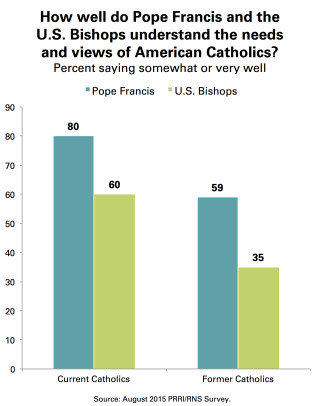 Catholics are 20 percentage points more likely to say Pope Francis rather than the U.S. bishops understands the needs and views of American Catholics. Eight in ten (80%) Catholics say Pope Francis understands the needs and views of the American Catholic community somewhat or very well. Six in ten (60%) Catholics say the U.S. bishops understand the American Catholic community well.
Catholics are 20 percentage points more likely to say Pope Francis rather than the U.S. bishops understands the needs and views of American Catholics. Eight in ten (80%) Catholics say Pope Francis understands the needs and views of the American Catholic community somewhat or very well. Six in ten (60%) Catholics say the U.S. bishops understand the American Catholic community well.
While white and non-white Catholics are equally likely to say that Pope Francis understands the needs and views of American Catholics (80% respectively), there is a notable intensity gap.3 Nearly half (48%) of non-white Catholics say that Pope Francis understands American Catholics “very well,” compared to fewer than one-third (32%) of white Catholics. White and non-white Catholics are about equally as likely to say U.S. bishops understand American Catholics well (60% vs. 58%, respectively).
Among former Catholics, there is a sharp divide in views of how much Pope Francis and the bishops understand the needs of the U.S. Catholic community. Roughly six in ten (59%) former Catholics say that Pope Francis understands the needs and views of American Catholics well, while only 35% say the U.S. bishops understand American Catholics well. Nearly half (46%) of former Catholics say the U.S. bishops do not understand American Catholics well, while about one in five (19%) offer no opinion.
The “Pope Francis Effect”
A majority (56%) of Catholics report that their feelings toward the Catholic Church have changed a lot or a little over the last couple of years, roughly the period of Pope Francis’ papacy. Roughly four in ten (42%) Catholics say their feelings have not changed at all over this time period. Notably, among Catholics who say their feelings about the Church have changed, nearly six in ten (59%) say their feelings have become more favorable, while 36% say they have become less favorable.
Pope Francis’ presence seems to have impacted the views of Democratic Catholics more than Republican Catholics. Democratic Catholics are more than twice as likely to say their feelings toward the Church have changed to become more favorable as they are to have become more unfavorable (42% vs. 17%, respectively). More than one-third (36%) say their feelings have not changed. In contrast, Republican Catholics are about equally as likely to say their feelings have grown more positive as to say they have become more negative (24% vs. 20%, respectively), but a majority (53%) say their feelings toward the Church have not changed.
Despite the influence that Pope Francis is having on how many Catholics feel about the Catholic Church, he does not appear to have had a major impact on how Americans overall feel about it. In the last couple of years, nearly six in ten (59%) Americans say that their feelings about the Catholic Church have not changed at all. However, among Americans who say their feelings have changed, a majority (54%) report that their feelings toward the Church have grown more positive, while roughly four in ten (41%) say they have become more negative.
Most Catholics believe Pope Francis will have a positive effect on the Church by spurring engagement among Catholics. Roughly two-thirds (66%) of Catholics say Pope Francis will attract more Catholics back to the Church, compared to only 20% who believe he will not. Fourteen percent remain unsure of the pope’s influence on the Church. However, former Catholics are significantly less optimistic about the pope’s capacity to reengage Catholics. A slim majority (51%) of former Catholics believe the pope will attract more Catholics back to the Church, while 29% say that he will not and 20% offer no opinion.
Views about the pope’s influence do not differ among Catholics by frequency of church attendance, ethnicity, or gender.
IV. Agreement with Pope Francis on Political Issues
Across a range of public policy questions, American Catholics are more likely to say they agree with Pope Francis than to say they disagree with him. However, a significant number of Catholics report being unfamiliar with the pope’s position on a range of issues, and there is evidence that some Catholics may not have an accurate understanding of Pope Francis’ positions.
Catholics are more than twice as likely to say they agree with the pope’s view on the role of government in reducing economic inequality as they are to say they disagree with it (52% vs. 25%, respectively). Catholics are also much more likely to agree than to disagree with Pope Francis’ views on immigration (50% vs. 17%, respectively) and climate change (47% vs. 24%, respectively). Similarly, American Catholics are more likely to say they agree with the pope’s view on same-sex marriage than to say they disagree with him (48% vs. 26%, respectively)—although American Catholics may not have an accurate understanding of his views on this issue, as outlined in the section below. On the issue of abortion, Catholics are about equally as likely to say they agree with the pope (38%) as to say they disagree with his view (39%). Notably, approximately one-quarter to one-third of Catholics report that they are not familiar with the pope’s views on these issues or offer no opinion.
In general, non-white Catholics are more likely than white Catholics to say they agree with Pope Francis’ views. Non-white Catholics are much more likely than white Catholics to agree with the pope on the role of government in reducing economic inequality (61% vs. 46%, respectively), the issue of immigration (65% vs. 39%, respectively), and the issue of climate change (56% vs. 40%, respectively). Non-white Catholics are roughly equally as likely as white Catholics to report that they agree with the pope on the issue of same-sex marriage (45% vs. 50%, respectively). Non-white Catholics are less likely than white Catholics to say they agree with the pope on the issue of abortion (30% vs. 43%, respectively).
There is also a sharp partisan divide among Catholics on these issues. Democratic Catholics are much more likely than Republican Catholics to agree with the pope’s view on the role of government in reducing the gap between the rich and the poor (64% vs. 42%, respectively), immigration (54% vs. 43%, respectively), and climate change (54% vs. 38%, respectively). In contrast, Republican Catholics report greater agreement with the pope on the issue of same-sex marriage (64% vs. 45%, respectively) and abortion (54% vs. 29%, respectively).
With the exception of the issue of abortion, frequency of religious attendance has little impact on the extent to which Catholics agree or disagree with Pope Francis across these issues. On abortion, a majority (56%) of Catholics who attend services weekly or more say they agree with the pope’s view, compared to only 28% of Catholics who attend services less frequently.
Confusion Over the Pope’s Position on Same-sex Marriage
Although Pope Francis has not changed the Catholic Church’s official position opposing same-sex marriage, nearly four in ten (38%) Catholics believe that the pope supports allowing gay and lesbian couples to marry legally. Roughly similar numbers of Catholics (43%) say the pope opposes same-sex marriage, while nearly one in five (19%) say they do not know the pope’s position or refused the question.
This misperception may be driven in part by the fact that Catholics are likely to believe that Pope Francis holds a position on the issue of same-sex marriage that is consistent with their own. Among the majority of Catholics who support same-sex marriage, nearly half (49%) believe that the pope supports this position as well, while 36% say he is opposed and 15% say they do not know the pope’s position. Among the minority of Catholics who oppose same-sex marriage, more than six in ten (63%) believe the pope also opposes same-sex marriage, while only 15% believe he supports this policy and 22% say they do not know the pope’s position
V. American Catholics on Selected Issues
On many important issues of the day, the opinions of Catholics overall do not differ appreciably from the general public. However, there are significant opinion differences among Catholics by ethnicity, religious affiliation, and party identification.
The Focus of the Catholic Church’s Public Policy Statements
When given a choice between two broad areas of focus for the Catholic Church’s statements on public policy, Catholics are more likely to say the Church should focus more on social justice and the obligation to help the poor as they are to say that the Church should focus more on abortion and the right to life (57% vs. 33%, respectively). There are notable differences among Catholics by frequency of church attendance and political background.
Fewer than half (48%) of Catholics who attend religious services at least once a week say that the Church should focus more on social justice and helping the poor, compared to 36% who say it should focus more on abortion and right to life issues. Among Catholics who attend less often, more than six in ten (62%) say the Church should focus on helping the poor and social justice issues, while about one-third (31%) say the Church should emphasize abortion and pro-life issues.
More than two-thirds (68%) of Democratic Catholics say the Church should focus more on social justice issues than on right to life issues. By contrast, a majority (53%) of Republican Catholics say the Church should place more emphasis on abortion issues than on social justice issues.
Catholic men are more likely than Catholic women to say that the Church should focus more on abortion and right to life issues (39% vs. 28%, respectively).
On this question, there are only modest differences between Catholics and former Catholics, and between white and non-white Catholics.
Government’s Role in Reducing the Gap between Rich and Poor
More than seven in ten Americans (71%) and roughly the same number of Catholics (72%) believe the government should do more to reduce the gap between rich and poor. Non-white Catholics (81%) are more likely than white Catholics (65%) to agree that the government should do more to address economic inequality.
Climate Change
A similar pattern is evident in the views on climate change. Nearly two-thirds (66%) of the general public and more than seven in ten (73%) Catholics believe the U.S. government should do more to address climate change. Non-white Catholics express much stronger support than white Catholics for increased government action on climate change (86% vs. 64%, respectively).
Immigration Reform
Roughly six in ten (63%) Americans and a similar number (61%) of Catholics say the current immigration system should allow immigrants living in the U.S. illegally an opportunity to gain citizenship provided they meet certain requirements.Similar numbers of white Catholics (58%) and non-white (64%) Catholics support a pathway to citizenship for illegal immigrants.
LGBT Issues: Same-sex Marriage, Nondiscrimination Laws, and Religious Liberty Exemptions
Catholics also do not differ markedly from the American public on the issue of same-sex marriage. A majority (55%) of Americans and six in ten (60%) Catholics favor allowing gay and lesbian couples to marry legally. Notably, roughly equal numbers of white Catholics (59%) and non-white Catholics (61%) support same-sex marriage.
Most Catholics also do not believe same-sex marriage violates their basic religious principles and commitments. A majority (53%) of Catholics disagree that same-sex marriage goes against their religious beliefs, while 42% agree. However, white Catholics are far more divided than non-white Catholics. Nearly half (45%) of white Catholics believe gay marriage goes against their religious beliefs, compared to only about one-third (35%) of non-white Catholics.
An even greater share (76%) of Catholics favor laws that would protect gay, lesbian, bisexual, and transgender people against discrimination. Roughly one in five (21%) Catholics oppose this policy.
Notably, relatively few Catholics support a broad religious liberty exemption to nondiscrimination laws. Roughly two-thirds (65%) of Catholics oppose a policy that would allow small business owners to refuse products or services to gay and lesbian people, even if doing so goes against their religious beliefs. Twenty-eight percent of Catholics support such religious liberty exemptions. Also of note, a majority (58%) of Catholics who attend religious services at least weekly and a slim majority (51%) of Republican Catholics also oppose allowing small business owners to refuse services to gay and lesbian people on religious grounds.
Abortion
On the issue of abortion, Catholic attitudes generally mirror Americans overall. A majority (53%) of Americans say abortion should be legal in all or most cases, while 43% say it should be illegal. Among Catholics, a slim majority (51%) says abortion should be legal in all or most cases, compared to 45% who say it should be illegal.
Slight differences along racial and ethnic lines exist on this issue. While a majority (54%) of white Catholics say abortion should be legal, fewer than half (45%) of non-white Catholics agree. A slim majority (51%) of non-white Catholics say abortion should be illegal in all or most cases.
There is also a striking partisan divide on this question, with Catholic Republicans’ and Democrats’ opinions producing mirror images of one another. Among Republican Catholics, roughly one-third (35%) say abortion should be legal in all or most cases, compared to 61% who say it should be illegal in all or most cases. By contrast, nearly two-thirds (65%) of Democratic Catholics say abortion should be legal in all or most cases, while 33% say it should be illegal in all or most cases.
Endnotes
1 The findings in the “Brief Profile of American Catholics” on the proportion of Catholics in the U.S. population, and analysis of American Catholics’ race and ethnicity, age, and geographic composition are based on PRRI’s 2014 American Values Atlas, which included interviews among a random sample of 11,115 Catholics. All other findings in the report are based on the August 2015 PRRI/RNS Survey.
2 In 1972 the General Social Survey found 27% of American population identified as Catholic.
3 The size of the sample did not permit a separate analysis of Hispanic Catholics. However, the overwhelming majority (83%) of non-white Catholics identify as Hispanic.
Recommended citation:
Jones, Robert P., and Daniel Cox. “The Francis Effect?: U.S. Catholic Attitudes on Pope Francis, the Catholic Church, and American Politics.” PRRI. 2015. http://www.prri.org/research/survey-the-francis-effect-u-s-catholic-attitudes-on-pope-francis-the-catholic-church-and-american-politics/.
